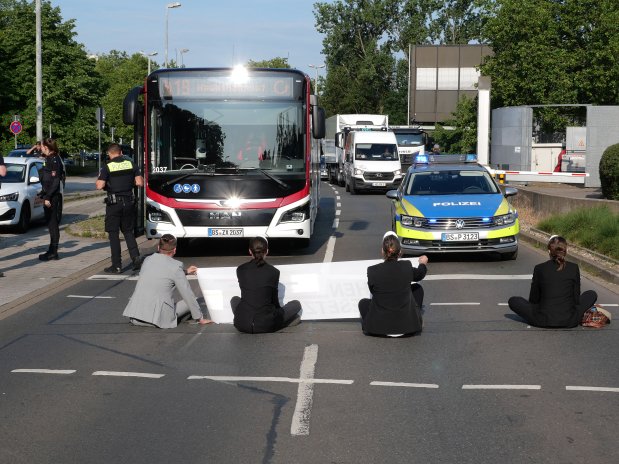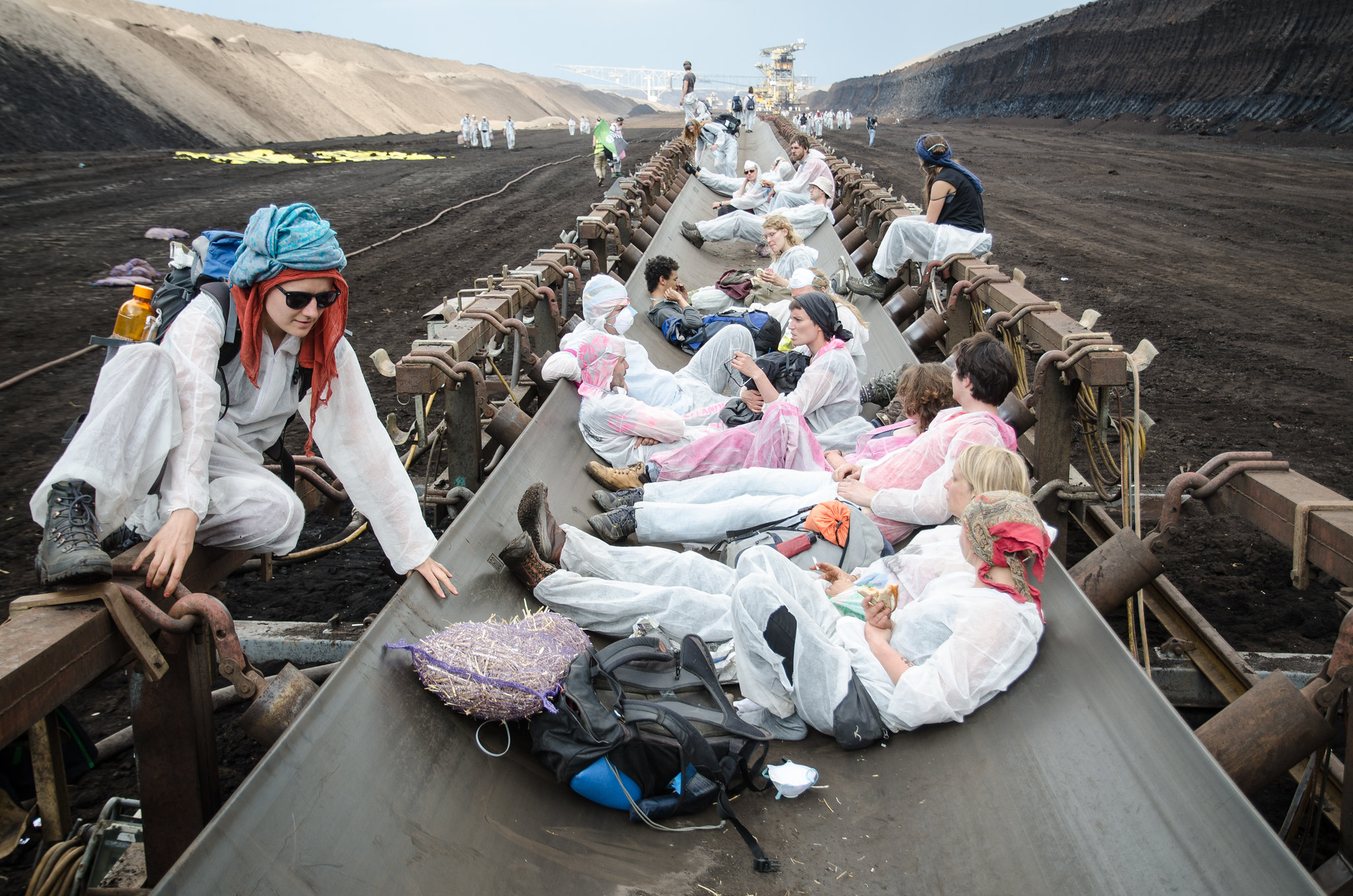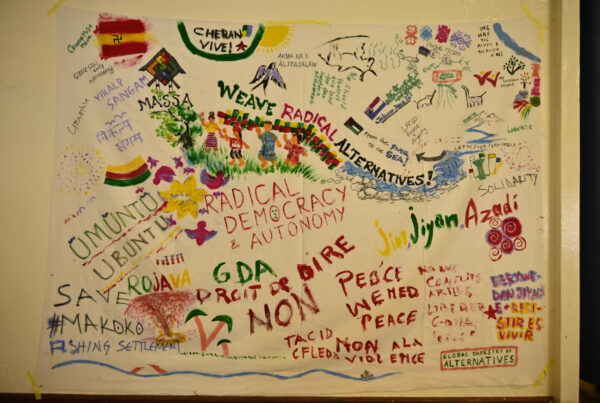by Lena Herbers
Climate activists are escalating their tactics everywhere to advance climate action and justice. But the response of states so far has focused on increasing repression, especially in Germany. Instead of discussing the legitimacy of protests, we should look at civil disobedience as emerging from profoundly democratic impulses.
“Climate RAF,” “criminals” or “offenders,” house searches and prison sentences – the debate surrounding the protests of the “Last Generation” activists has been heated in Germany since the beginning. The activists have been drawing attention to the climate crisis with very different forms of protests. They have been blocking streets by sticking their hands to them with superglue, throwing food at works of art, blockading the airport, paint bag attacks on ministries and party headquarters, but most recently also on private jets and luxury hotels and stores. These protests were followed by harsh reactions from politicians.
Many attempts of delegitimization
For instance, at the end of November 2022, Andreas Scheuer of the conservative regional party CSU called on the Minister of the Interior and the Minister of Justice on “twitter” to simply lock up the activist, the “climate criminals” and at the same time CDU party leader Friedrich Merz talked about the fact that as long as the protesters, whom he calls “criminals”, are in custody, there is “peace outside”.
In Munich, a general decree was used to ban supergluing to streets, and in Bavaria activists were taken into preventive custody. The tightening of penalties was also a topic in the German parliament ‘Bundestag’, as the CDU and CSU called for harsher penalties for “street blockers and museum rioters” in a proposal in the Legal Affairs Committee. The list of repressive measures is long and ranges from political defamation such as the designation as “climate RAF” and the first prison sentences for activists who blocked the street. On the 24th of May repression reached its preliminary climax with police raids all over Germany in which the private residences of several activists were searched as well as the access to the group’s assets seized. These political actions and legal measures are intended to discredit and delegitimize climate protest. It is no coincidence that these legal measures were initiated in Bavaria. There, the state parliament will be elected in the fall and the conservative CSU wants to mobilize its voters. Moreover, in Germany right now there is a heated debate about whether these protests are a terrible imposition or whether such actions are justified and important in the light of the climate catastrophe.

Activists from last generation block a street in Braunschweig (Germany). Source: Letzte Generation
Climate crises requires urgent actions
But let’s get the facts straight: Looking at the current situation, it is not uplifting at all. There is enough scientific evidence that current climate policy measures are not sufficient to curb climate change. In their April 2022 report, the UN and the IPCC (Intergovernmental Panel on Climate Change) point out that millions of climate deaths, species extinction and the widespread destruction of livelihoods are inevitable consequences of current climate change. Germany is one of the world’s largest CO2 emitters. In terms of cumulative CO2 emissions, it ranks sixth worldwide. Germany’s remaining CO2 budget for reaching the 1.5° target is already used up by 2032 at current annual emissions. However, climate neutrality is not legally stipulated until 2045 – and even for that, the currently planned measures are not sufficient. Urgent action is therefore needed to stem the further worsening of global inequality caused by the climate crisis.
This gloomy forecast for the future results in great and short-term pressure on society to take action. The more time passes, the more urgent the necessary measures become. Therefore, the activists of the climate movement try to point out that not only they but also leading climate scientists demand drastic action. Moreover, the measures taken so far are not in line with the fact that, according to studies, a large part of the population in Germany considers climate and environmental protection to be a very important issue.
Nevertheless, at the political level, the legitimacy and concrete forms of climate protection have been fought over for years. The agreement reached at the Paris climate summit with a number of compromises has now been undermined for years by decision-makers. For example, the first version of the German ‘Climate Protection Act’ was even ruled unconstitutional by the German Supreme Court because it was not ambitious enough. In the ‘climate protection judgment’ from March 24th, 2021, the German Supreme Court ruled that for this reason the civil rights of younger and subsequent generations are at risk.
Civil disobedience is often in context of severe crises
In my research project I analyze documents of different social movements in Germany since the 1970s: the anti-nuclear movement, the peace movement and the climate movement. In order to reconstruct negotiations around the legitimacy of civil disobedience, I analyze judicial verdicts and verdict justifications as well as activist documents (calls for blockades, defense speeches, press releases).
In the analysis, a clear pattern emerges: activists use means such as civil disobedience in the context of their protest when major threats or crises are at stake.
Looking at the current protests of the climate movement and especially the “Last Generation”, there is a particular emphasis on the current long-term life-threatening crisis, which is in contrast with the actions of politicians so far. “Last Generation” activists call for ecosystems to be protected by the federal government taking steps to achieve the goal agreed to in the Paris Climate Agreement. Great hope was placed in this agreement by the climate movement. The fact that now, both internationally and nationally, the pledges agreed to at that time are not being kept, means that activists have since been trying with ever greater vigor to remind politicians of the pledges made and to call on them ever more clearly to take the actions necessary to achieve them.
This is an attempt to legitimize the protest actions, even if the activists commit crimes with their protest. The references to scientific findings also contribute to the legitimization of this form of protest.

Police stops the occupation of the coal mine by activists of ende gelände in 2018. Source: Nora Börding
A look into theory…
So let’s have a look on what philosophy and social sciences can tell us about civil disobedience and it’s legitimacy. The American philosopher John Rawls, in his major work “A Theory of Justice”, considered the central work of contemporary political philosophy, summarizes the question being negotiated here as follows:
“At what point is the duty to obey laws passed by a legislative majority […] no longer binding, given the right to defend one’s liberties and the duty to resist injustice?” (Rawls 2020, Eine Theorie der Gerechtigkeit, p. 400)
There are two main perspectives on this question, a liberal-democratic one, which will be dealt with first, and a radical-democratic one. The liberal-democratic view states that within a largely well-functioning representative-democratic system, people can, on the basis of autonomous and responsible decisions, address through civil disobedience a public appeal to the sense of justice of the majority of their fellow citizens. They can point out that certain measures, regulations or laws are in contradiction with the generally shared principles of justice and/or constitutional principles. According to this view, civil disobedience contributes to the preservation and strengthening of just institutions and is an elementary component of the democratic system.
This contrasts with a radical democratic understanding. Here, the fundamental political meaning of civil disobedience takes center stage. Civil disobedience arises from this perspective insofar as many citizens are convinced that other possibilities for bringing about change are not available. It is part of the “everyday political dispute” (vgl. Heuer u. a., Arendt-Handbuch 2011, S. 118.) and an expression of the political practice of citizens, who in this way can object to political action, even “if […] the ‘normal’ institutional channels are closed off or do not effectively transmit their objection” (Celikates, in: Das Politische und die Politik 2010, S. 290.). Civil disobedience can compensate for existing democratic deficits and enable participation (Celikates, Democratizing civil disobedience, Philos. Soc. Crit. 2016, 991). From this radical democratic perspective, civil disobedience is founded in the ongoing production of the democratization process and not only in the ‘state of emergency’ of certain justice deficits, as is done from a liberal democratic perspective.
… and back to the practice of civil disobedience
Against the background of the theoretical considerations on civil disobedience, the actions of climate activists can first be understood as an indicator of a social grievance, because the activists of the climate movement and the “last generation” use their protest to point out the insufficient climate protection measures. Their focus is the endangerment of fundamental principles, in the case of the climate movement the preservation of our ecosystem and livelihoods.
Another deficiency indicated by the protests is that younger people in particular are less represented politically on the one hand and have to live with the consequences of the climate crisis to a greater extent than older generations, since their life expectancy is significantly higher.
In this respect, it can be stated that the current protests indicate an existing democratic deficit. This is because the protests are triggering a public debate around these very problems.

Activists from Ende Gelände blocking a coal digger in 2016. Source: Tim Wagner
Harsh reactions on protest instead of climate politics
In the social debate around the protests, the reactions to the climate activists, much is revealed about our social approach to the climate crisis. Instead of debating measures and political steps, we talk about the protest and its legitimacy.
The harsh reactions to these protests rather show that there is an attempt here to deny the legitimacy of the activists’ protest. If you look at what is being scandalized in this context, it is not the lack of political measures, but the protest against them. Of course, this is no coincidence, but an attempt by those political actors who reject climate protection and who, in the face of the worsening climate crisis, are trying to portray the climate protests as the problem and not the lack of action by politicians and their apparent lack of will to act. You can see how well this works in the current debate , because this is also about the protest and its limits and not the inadequate climate policy of the federal government in Germany.
Estimates of protest change
A look at the history of social movements shows that they have repeatedly been subjected to fierce criticism and attempts to discredit them. Even those movements that are now considered an important part of democratic development, such as the American civil rights movement of the 1960s.
Today, there is a consensus that this has contributed decisively to at least reducing massive injustice and institutionalized racism. The German peace or anti-nuclear movement have a similar history, as they were repeatedly placed in the vicinity of criminals and terrorists. In the meantime, this assessment has changed and a large part of the demands of the anti-nuclear movement have been implemented by the decided nuclear phase-out.
This can also show that attitudes towards the climate movement might change. In climate policy, too, it is not too late for a radical change of course. However, this usually requires perseverance on the part of the movement, convincing large sections of the population of the importance of the issue and, as a result, a large mobilization of protesters. But the massive resistance of politicians, conservative media, etc. also show that the movement needs new strategies again and again in order to continue to exist.






